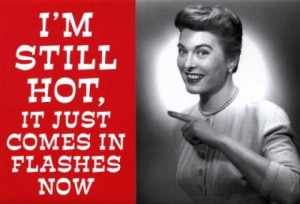 There were many reasons why I didn’t admire the politician, Teresa Gorman, but there was one particular aspect of her life which I admired greatly: her attitude to the menopause. She proudly declared herself ‘St Teresa of the menopause’, and campaigned for the wider availability of HRT. Now I am not an advocate of HRT because I think the risks haven’t been explored as widely as they might be, but for some women, HRT is an absolute lifesaver. Gorman’s biggest contribution, in my view, was talking about a subject that was considered taboo by so many people, even today in the 21st century.
There were many reasons why I didn’t admire the politician, Teresa Gorman, but there was one particular aspect of her life which I admired greatly: her attitude to the menopause. She proudly declared herself ‘St Teresa of the menopause’, and campaigned for the wider availability of HRT. Now I am not an advocate of HRT because I think the risks haven’t been explored as widely as they might be, but for some women, HRT is an absolute lifesaver. Gorman’s biggest contribution, in my view, was talking about a subject that was considered taboo by so many people, even today in the 21st century.
A couple of days before Teresa Gorman’s death I attended a seminar on Coaching Through The Menopause, run by Deborah Price and Tim Taylor (more of that in a moment). Later that evening I was telling some friends where I had been. One of my male friends seemed totally unable to say the word ‘menopause’. On the one hand he thought it was an important topic, but on the other he couldn’t actually utter the word. This is someone who I think of as being open-minded, in his 50s, very much in tune with nature (he’s a gardener and landscaper), and interested in complementary therapies. But he couldn’t say the word menopause. And I suspect he is not alone.
If men have difficulty with mentioning the menopause in a social situation, how much more difficult for them in a work environment?
This was one of the topics covered by the seminar itself. Deborah Price and Tim Taylor are business partners working in the leadership coaching and training arena. Deborah went through nine kinds of hell with her menopause, and at a certain point had to tell Tim what was going on. They did some research on the topic, and wrote an article for Coaching at Work which won the Coaching at Work’s 2014 Thought Leadership Award. You can read the article here.
Because the menopause is still a taboo subject for many people, women included, the menopause itself can be a very isolating experience. If you’re suffering with tiredness, or surprise bleeding, or mood changes, and you’re in a predominantly male workplace, you may not have many people you can ask to watch your back. TIm and Deborah’s research indicates that organisations loose around 25% of their senior female talent because of the menopause and its impact on their working lives. Given the concerns about the difficulties of getting women into the Boardroom, this is clearly an area for further investigation.
One of the challenges is the attitude of other women. Some women fly though their menopause. I’m a case in point. At the time I was actively involved in the complementary therapy world, so as soon I thought I might be peri-menopausal (i.e. hormones starting to decrease), I went straight to an acupuncturist friend, who specialises in women’s fertility, and started on a course of Chinese herbs. I don’t know how far the herbs and acupuncture helped, and I never will, but I do know I had it easy. Because of this, it would be very easy for me to assume – as many female managers do – that women taking time off because they are struggling with menopause symptoms were just being wimpy, or over-reacting. And, if I am honest, I think there was a time when I did assume this.
However, as I have watched friends and colleagues having ‘difficult’ menopause experiences my view has changed.
Things to remember about the menopause
As PJ Cousin, my acupuncturist friend says, ‘the menopause is not a pathology’ – it is not a disease. It’s a natural part of life. It’s certainly not something to be ashamed of, and emotions like shame can affect the way you respond to the changes in your body.
While the menopause is a hormonal process, it often happens at a time we we are facing up to life situations which challenge us emotionally. The children are leaving home, our roles are changing, the changes in our bodies make us feel less feminine, we start to feel that we are no longer young – perhaps we even start to fear old age, feel unattractive, fear ending up alone. Very often, we’ve been at the top of our game when these bloody physical symptoms suddenly kick in and stop us from acting like superwoman.
What can you do if you’re having a difficult menopause?
- Talking and sharing what’s going on can be incredibly helpful. If your own circle is unsympathetic, a coach may be helpful. There are coaches who specialise in menopause coaching, and if you already have a coach it’s worth talking to them in the first instance. There are also menopause support groups, although the majority seem to be online. Mumsnet has a whole series of threads on the menopause, many of which are very sympathetic. If you can talk to colleagues, do so. Ironically, you may find the men more sympathetic than the women!
- Educate yourself on what is actually going on in your body. Google and Amazon are wonderful things! Physically the menopause is all about hormonal changes in your body, and many of the menopause symptoms are physical – for instance hot flushes, night sweats, vaginal or other dryness (for me it was my eyes!), bladder control issues, abdominal pain. However, many women experience significant emotional symptoms, whether it’s mood swings or depression, or fear, or just a feeling of being lost.
- Test the water at work. Don’t assume that a female boss will be more sympathetic, or that a male boss will be unsympathetic. Oddly enough, the reverse seems to be true. You have to accept that not everyone is comfortable discussing the topic, but the truth is if you are experiencing sudden embarrassing bleeds, it’s generally better to discuss the topic with colleagues than to hope it will go away. If your energy levels have collapsed, or you are experiencing dramatic mood swings it will have a impact on your performance. Raise it with them before they raise it with you, or before it becomes a disciplinary issue. You’re not obliged to share medical issues with your employers, but if you have told them about it, you’re in a much stronger position if your relationship with them starts to deteriorate.
- Educate yourself on the therapeutic options. The menopause is a natural part of the ageing process. The Chinese call it ‘The Second Spring’ because there is something very liberating in being free of periods and allowing yourself to step into your wisdom and a new rhythm in life. If you’re planning to self-medicate, be very careful. There are many ‘natural’ remedies out there, but just because they are natural doesn’t mean they can be randomly mixed with other remedies. If you can get to Kensington or Wimbledon, I would definitely recommend PJ Cousin for acupuncture and Chinese herbalism. If not, see who there is available locally.
- Reduce stress. When we are stressed, our hormones go out of kilter. The menopause also changes the hormonal balance in the body. Double whammy! Excessive stress can intensify the more challenging aspects of the menopause.
- Look at nutrition and lifestyle. There’s a fair body of evidence that suggests that nutrition, diet and exercise can really help with managing the menopause.
- Don’t beat yourself up! Just because some women have a very easy menopause, doesn’t mean you are bad or stupid or at fault if you are having a difficult time. There’s a lot of educating that needs to be done in this area so that people understand that natural does not necessarily mean easy or easily ignored – look at pregnancy! And this IS a natural process.
- Attend to your needs. What do you need? How can you give yourself more care? Maybe an occasional massage? Even if you are on a tight budget, it’s worth thinking about how you can jig your finances so you can afford some self-care.
- Look for new opportunities. This is a time for reflection because we are entering a new phase of life. There’s no point fighting it, and fighting it may well intensify any physical symptoms because of the stress factor. Are there things you always wanted to do that you now have time to do? Is it time to make some changes?
- Spend some time on your finances. The average age for a woman to reach menopause in UK is 51. Chances are, if you are currently in your 50s, you grew up thinking you would retire at 60. Only now the age of retirement is 67. Check what pensions you have, and when they will mature. Are your National Insurance contributions up to date? A lot of women let them lapse when they have kids, without thinking about the overall impact on their pension payout later on. If you have a partner, discuss your life plans together. Do they see themselves working to official retirement age then stopping? Do you see yourself working to official retirement age and working on? Or vice versa. Or neither. It may seem strange to associate finances with menopause, but finances can be a huge source of stress – or a huge source of pleasure!
- Check in with your GP. If you are noticing changes in your periods, or any other unusual symptoms then book a GP appointment. There is a blood test they can do (testing FSH, follicle stimulating hormone) to determine whether you are peri-menopausal. (Perimenopause is a medical term for the time when women transition into full menopause).
If you’d like to discuss coaching to support you working through the menopause, please get in touch.

Are you the Jane Lewis that wrote the book me and my menopausal vagina? I have vaginally atrophy, it is a miserable condition, sometimes I feel like my whole life revolves around my burning , dry painful vagina. ( and I’ve had serious bowel surgery for diverticulitis this year) the atrophy is worse! I have been recommended the book from someone. I am in Australia , where can I get it? Could I get it through iTunes?
I’m sorry that is not me, so I don’t know the book or where to get it. Amazon? Hope you find it. All the best. Jane